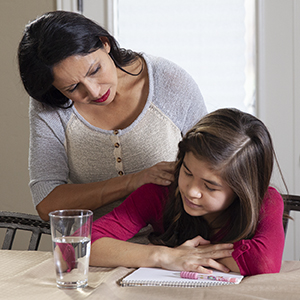Recognizing the Signs of Substance Abuse in Teens
Teens are not adults. But they often have to make adult decisions about drugs and alcohol. Try to be aware of the pressures teens face and learn the signs of substance abuse. If your child has a problem with alcohol or drugs, take action. Your healthcare provider can help.
Why do teens abuse drugs?
Some of the most common reasons kids try drugs include:
-
Peer pressure. Teens often face intense pressure from their friends to try drugs.
-
Social anxiety. Teens may think drug use will help them fit in. Or they may believe it will make them more relaxed and outgoing.
-
Curiosity. It's normal for teens to want to find out about drugs for themselves.
-
Problems with school, parents, or sex. Teens often think that getting high will solve their problems.
-
Depression. Alcohol and drugs can be used to self medicate and mask the symptoms of depression.
What are the warning signs?

It can be hard to spot drug use in teens. That's because their lives are often in turmoil. Also, many signs of drug abuse may be signs of other problems. These may include depression, anxiety, and eating disorders. You should be concerned if your teen:
-
Falls behind in school. A drastic drop in grades may signal a serious problem.
-
Withdraws from family and old friends
-
Gives up doing things they used to enjoy, such as playing sports or music
-
Lies or steals
-
Takes excessive risks
-
Seems moody or depressed
-
Is very hostile
-
Gets in trouble with the law or at school
-
Talks about death or suicide
What to watch for
Family and friends are often the first to recognize the warning signs of suicide. Suicidal thoughts or actions are not a harmless bid for attention. They are a sign of extreme stress and should not be ignored.
If your teen talks about suicide or harming others and has a plan and the means to carry it out: Don't leave them alone. Take action. Remove the means such as guns, rope, or stockpiled pills. If your teen is in great danger of self-harm, call or text 988.
What you can do
Talk to your teen about drug use. Try not to react too strongly. Most of all, listen to what your teen has to say. If your teen is in trouble, talk with someone you trust. That might be your healthcare provider, a school counselor, or local mental health clinic. Many school districts now have drug abuse counselors who can help. Or contact one of the many groups that deal with drug abuse.
Overdose help. If you are worried that your teen is using drugs, learn about naloxone and talk with your child's healthcare provider. Naloxone is a medicine that can be used in an emergency to quickly reverse an opioid overdose. It can be used in people who have overdosed on an opioid and are not breathing normally. Naloxone has no effect on someone who doesn't have opioids in their system. It's not used to treat an opioid use disorder. Examples of opioids include heroin, fentanyl, oxycodone, hydrocodone, codeine, and morphine.
To help keep your kids away from drugs
Here are some ways to be involved:
-
Spend time with your teen. Take turns selecting something to do together at least once a week.
-
Don't be afraid to ask questions. Find out where your children are going and who their friends are.
-
Try to be there when your children get home. The peak time for drug and alcohol abuse is between 4 pm and 6 p.m.
-
Don't lecture. Teens need to know they can come to you for help.
-
Be a good listener. Find out what your teen enjoys, dislikes, and values in his or her life. In other words, get to know your child's hopes and fears.
Online Medical Reviewer:
L Renee Watson MSN RN
Online Medical Reviewer:
Marianne Fraser MSN RN
Online Medical Reviewer:
Paul Ballas MD
Date Last Reviewed:
7/1/2022
© 2000-2024 The StayWell Company, LLC. All rights reserved. This information is not intended as a substitute for professional medical care. Always follow your healthcare professional's instructions.